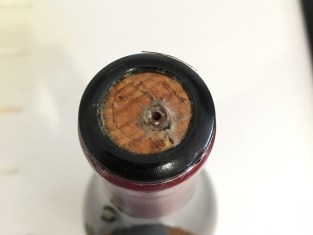This experiment was done on a good condition Pichon Baron 1986 over a long period of 6 months. A glass of wine was poured using coravin every month from the same bottle, the wine was kept at wine cellar at 15°C and was let standing up a few days at room temperature before each pour.
Day 1 – Calibration and Detailed tasting note
A classic Pichon Baron from a great vintage. Didn't do it justice by not decanting the wine, but a few swirls bring out the beautiful complex aromas of red and blackfruits, dried meat, perfumed oak smoke and plenty of elegance.
As expected from 86, the tannins are still standing strong, good acidity but it doesn't offer the richness and weight of 1989. Some undergrowth, not particularly long finish but very pleasurable.
With the exception of first growth equivalent wines, a lot of 1986 Bordeaux wines are about to go downhill (if not already). Drink up.
91/100
Day 30 – No observable difference after 30 days
91/100
Day 61 – Still going strong with slightly less intense nose
89-90/100
Day 91 – Starting to evolve with more with less brightness
85-86/100
Day 122 – Obvious oxidised aromas and went down hill in the glass
80/100
Day 152 – Oxidized aromas and dryness, similar quality with glass from 31days ago
78-79/100
Day 183 - The quality has decreased significantly compared with the first glass 6 months ago.
This wine is a lot more macerated and showing a lot of creamy oxidized aromas and tobacco flavor. Barely drinkable.
75/100
In conclusion, I would not leave a coravined bottle for more than 3 months, especially if the wine is fully mature already!






Experiment #2 Subject - G. Roumier Chambolle Musigny 2008
First puncture with Coravin on 12th January 2017. Quantity - one large glass of wine (around 175ml).
G. Roumier is one of the most reliable producers for a Chambolle Musigny village wine, the only problem is getting hold of them.
This 2008 G. Roumier Chambolle Musigny is in an awkward stage, maturing and slightly closed down. Bouquet of dazzling red berries, underbrush, clean meat and juicy currents. There is a great intensity for a village wine, plenty of acidity driven flavours and detailed character. G. Roumier village wines cannot be drunk young, they perform brilliantly after 10 years or more.
88-89/100 Tasted on 12th Jan 2017
The bottle was then stored horizontally for 7 months @13 degrees celsius.
After 7 months (13th August 2017), when I removed the foil capsule, I was immediately alarmed by the large hole from the Coravin needle puncture, there were also some mould fungus around the punctured hole.
Thankfully, the wine was completely fine. I cut the cork into two pieces and there were no signs of any needle puncture inside the cork, suggesting the cork's elasticity worked very well on recovering from the puncture.
The wine tasted very fresh and it hasn't lost any of the characteristics compared to the first glass I experienced from 7 months ago (on 12th Jan 2017). Very creamy, freshly picked cherry and round with a bubblegum new oak tone, mixed with hints of meaty flavours (Roumier style). Very charming and it hasn't lost any freshness after 7 months. Very impressive.
89/100 Tasted on 13th Aug 2017
However, I would be more cautious with using Coravin multiple times on a single bottle. Wines generally mature at a faster rate when the same bottle has been needle punctured more than once.
Tips when using Coravin:
1. Give the Coravin a little squirt of argon gas before pushing the needle into the wine
This prevents any oxygen inside the Coravin system and needle getting inside the bottle, and eventually oxidising the wine. By squirting a tiny bit of argon gas out, you are also checking if the argon gas tank is empty or not.
2. Avoid puncturing the cork multiple times at the same spot
The spot/hole after the first puncture are likely to have fungus and bacteria on it, these fungus and bacteria thrive on these damp hole. Prevent any harmful fungi and bacteria from spoiling the wine by puncturing different surfaces on the cork. This will also optimise the cork's elasticity and minimising exchange of external air.
3. Don't leave a bottle that has been Corvained for more than 1 year
So far from 13 out of the 13 Coravin subjects, I can conclude that Coravin works brilliantly for short to mid-term storage on any bottles of wine. After multiple studies, generally a bottle that has been Coravined can last for an extra 6 months without much effects on the wine. However, a wine that has been Coravined DOES NOT age as well as a bottle that hasn't been Coravined in the long term (8 months or above).